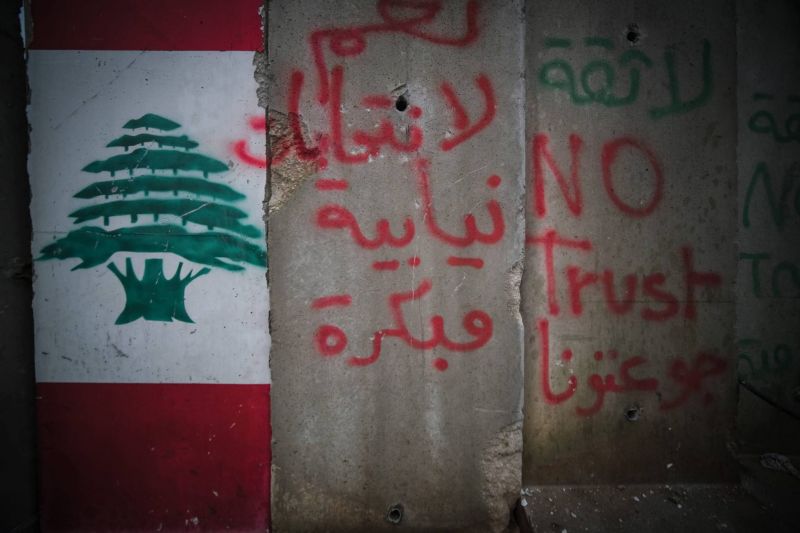
Street art in Beirut. (Credit: João Sousa/L'Orient Today)
Since Hamas’ “Al-Aqsa Flood” operation on Oct. 7, and Israel’s bombardment of Gaza, there have been continuous harrowing updates of the deteriorating humanitarian situation in Palestine, as well as growing tensions at Lebanon’s southern border.
Given the rapid pace of the conflict, it’s difficult to keep track of the other things that have happened in Lebanon. We offer you a quick recap:
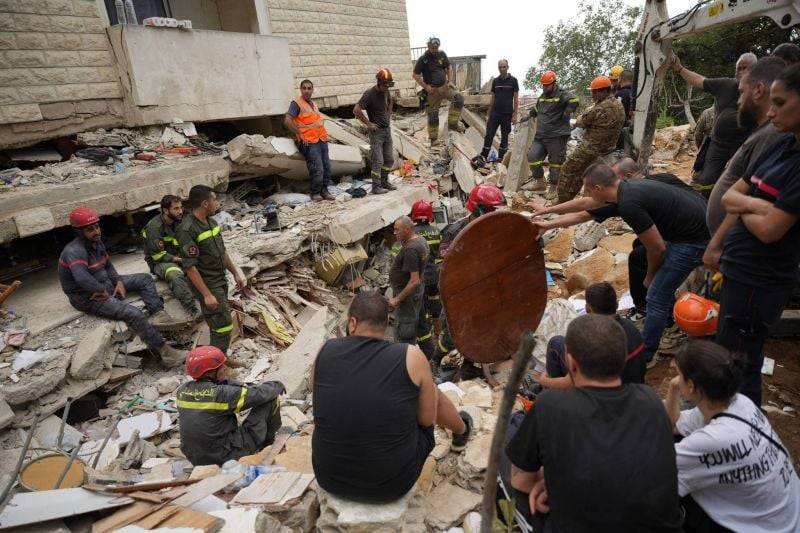 Civil Defense and Red Cross teams work to find survivors of the Mansourieh building collapse. (Credit: Mohammad Yassin/L'Orient-Le Jour)
Civil Defense and Red Cross teams work to find survivors of the Mansourieh building collapse. (Credit: Mohammad Yassin/L'Orient-Le Jour)
Mansourieh building collapse kills eight
The Edmond Yazbeck Block E building in Mansourieh’s Badran neighborhood collapsed on Monday, Oct. 16, after heavy rain. The Civil Defense’s rescue operations concluded that Saturday, confirming that eight people had died and the rescue of four survivors from the rubble.
The cause of the collapse remains unclear. A resident from a neighboring building said that rain from the previous night flooded his basement, theorizing that the water weakened the collapsed building’s foundation. After surveying the collapse site, engineer Rached Sarkis, who was appointed by the Governor of Mount Lebanon to oversee the incident, said water can have a harmful impact on “already dilapidated” concrete.
Cracks appeared in the building the weekend before the collapse, one of the building’s residents told L’Orient Today. President of the Order of Engineers and Architects Aref Yassine said renovation work on the building had been "poorly executed" after the Mansourieh municipality reportedly issued a warning about the building’s “fragility.”
The Lebanese Association of Properties (LPA), claimed in an Oct. 10 statement that there were 16-18,000 buildings at risk of collapse in Lebanon, further stressed by overdue maintenance works, climate change and improper drainage. The statement added that most buildings built before 2005 do not conform to international safety standards. LPA head Andira Zouhairy said “harsh” weather conditions can heighten the risk of collapse.
A parliamentary subcommittee was formed last November to track buildings at risk of collapse after a Tripoli school’s roof fell in, killing a 16-year-old student. In February, the government ordered a review of buildings damaged by tremors from the devastating Feb. 6 earthquake that killed more than 50,000 people in Turkey and Syria.
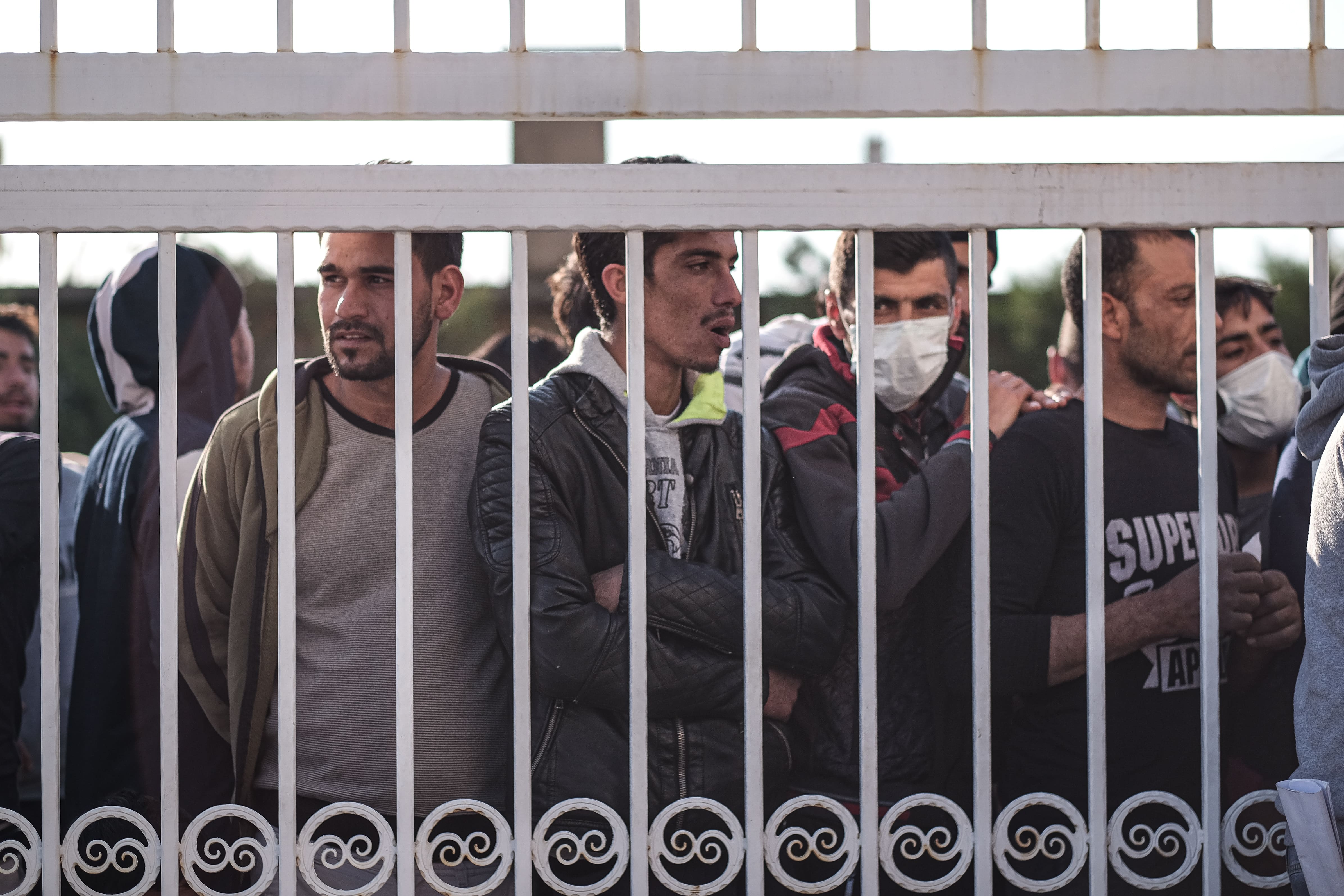 Syrian refugees line up for aid after a fire burnt down their camp in northern Lebanon in 2021. (Credit: João Sousa/L'Orient Today/File photo)
Syrian refugees line up for aid after a fire burnt down their camp in northern Lebanon in 2021. (Credit: João Sousa/L'Orient Today/File photo)
Lebanon still in talks to repatriate Syrian refugees
Before the start of the Israel-Hamas war, Lebanese headlines were dominated by news from another frontier — the northern border with Syria and reports of daily, unregulated crossings by Syrian citizens into Lebanon. These reports came amid broader crackdowns by Lebanese authorities on Syrians living in the country.
On Oct. 11, caretaker Foreign Affairs Minister Abdallah Bou Habib met his Syrian counterpart Faisal Mekdad on the sidelines of an Arab League summit in Cairo. They agreed that Bou Habib would visit Damascus to discuss, among other things, Syrian refugees in Lebanon. Bou Habib and Mekdad did meet on Oct. 23 and said in a joint statement that they agreed on the importance of guaranteeing a “dignified return” for Lebanon’s Syrian refugees and the international community’s role in achieving this goal.
After his meeting with the United Nations Deputy Special Coordinator for Lebanon, Bou Habib said on Oct. 25 that the government is giving the UN until the end of October to submit previously requested data on Syrian refugees in Lebanon.
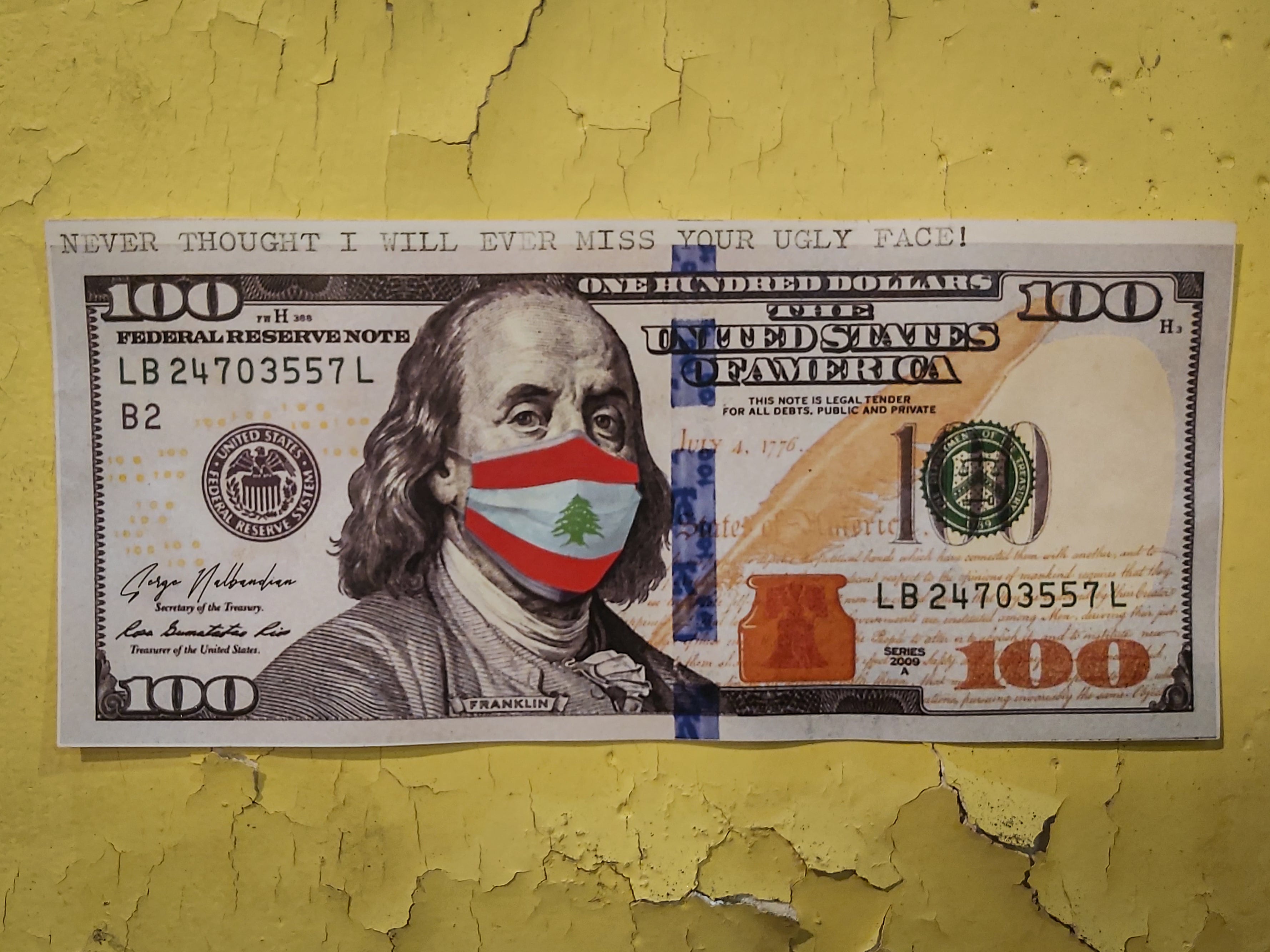 Street art in Beirut. (Credit: João Sousa/L'Orient Today)
Street art in Beirut. (Credit: João Sousa/L'Orient Today)
2024 Budget delivered but still being discussed
Weeks before the Israel-Hamas war, the caretaker cabinet delivered its budget, the first government budget to be delivered on time since 2002. The text, which comes into effect once published in the Official Gazette, still must be approved by Parliament’s Finance and Budget committee and be put to a vote before the legislature.
The Finance and Budget parliamentary committee began reviewing the 2024 budget on Oct. 9. After the session, committee head MP Ibrahim Kanaan said the calculation of taxes at LL85,000 to the dollar — an exchange rate close to that of the parallel market (around LL89,000) — was inconsistent with the text’s provisions for public sector salaries, which after several adjustments remain well below their previous dollar values. Kanaan further criticized the absence of tax reform in the text, which he berated for allocating less than 0.7 percent of spending to investments. The committee was also dubious regarding the projected revenue of LL277 trillion, which left a LL17,189 billion deficit.
The committee held another session on Oct. 16, during which it objected to four of the 14 articles in the first section of the budget (relating to loan permissions, mechanisms to accept donations and loans, credit transfer and central bank-subsidized loans).
During its third session, on Oct. 19, the committee canceled four of the text’s items, concerning income tax, payments to public institutions to expedite procedures, and value-added tax. In an Oct. 23 statement on X (formerly Twitter), committee member MP Mark Daou said the budget placed heavy tax burdens on citizens. Daou said the committee refused to dollarize the state’s incomes and to tolerate the informal cash economy.
After the fourth review on Oct. 25, the committee requested representatives from the Justice and Tourism ministries and from Banque du Liban (BDL) attend its next session. Kanaan repeated his criticisms regarding a lack of vision in the budget, the absence of investment and the disparity between public sector salaries and taxes — which he claimed were set haphazardly with the sole goal of increasing revenues.
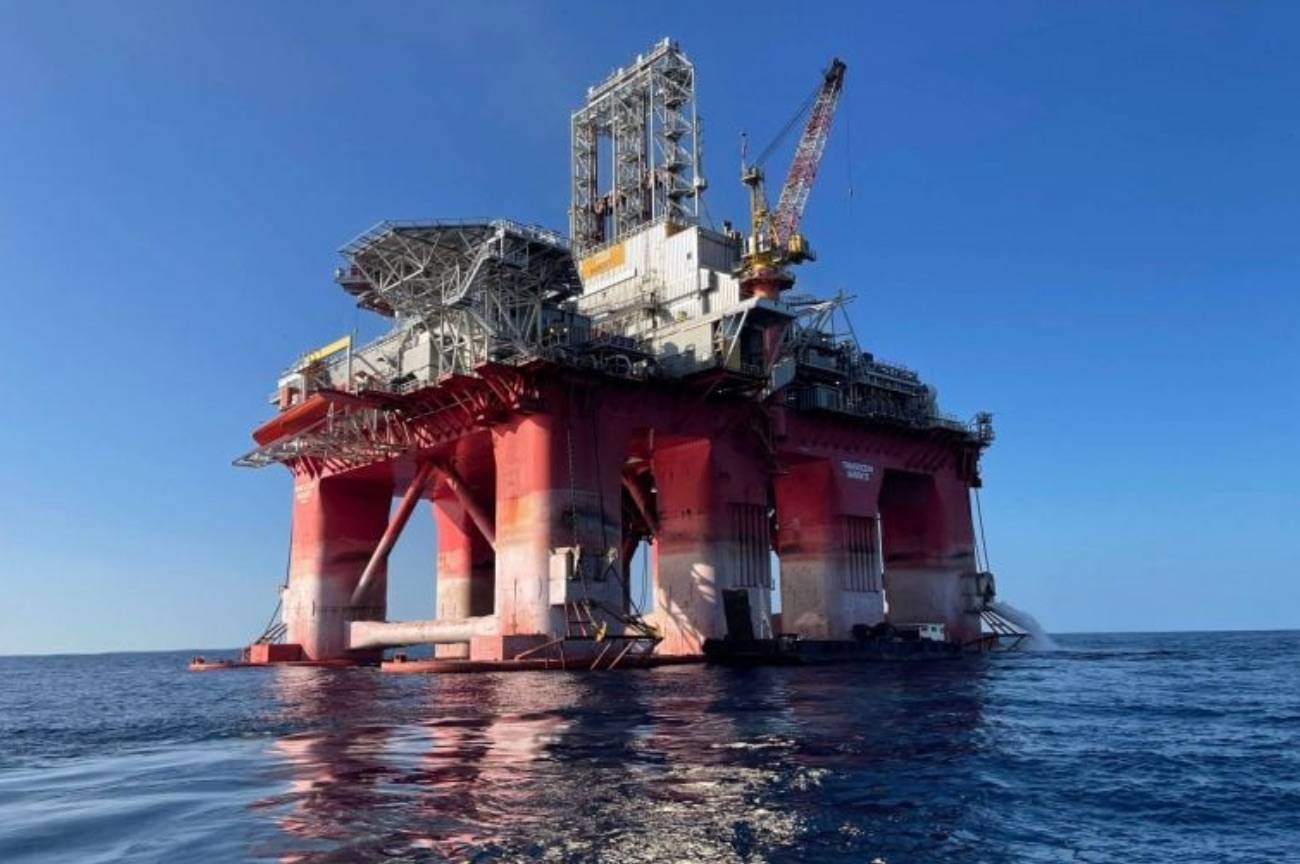 The Transocean Barents drilling platform installed in Lebanese territorial waters in search of offshore gas. (Credit: TotalEnergies/AFP Archives)
The Transocean Barents drilling platform installed in Lebanese territorial waters in search of offshore gas. (Credit: TotalEnergies/AFP Archives)
Oil and gas exploration: Confusing preliminary results
The Lebanese Petroleum Association said on Oct. 19 that a positive atmosphere prevailed concerning preliminary results from exploratory drilling in offshore oil and gas Block 9, though commercially viable quantities of gas were not found, according to a statement from caretaker Energy Minister Walid Fayad issued the same day.
In a statement clarifying the results, the Lebanese Petroleum Association (LPA) said that it was awaiting a technical report from TotalEnergies and that a final assessment was expected by the end of the year. Meanwhile, the LPA pointed to two promising findings. The first is the geological similarity between Lebanon’s exploration site and that of the drilling area where Israel is currently extracting gas. The second is the detection of natural gas which, while not in commercial quantities, may justify further mapping to find larger reserves in and around the block.
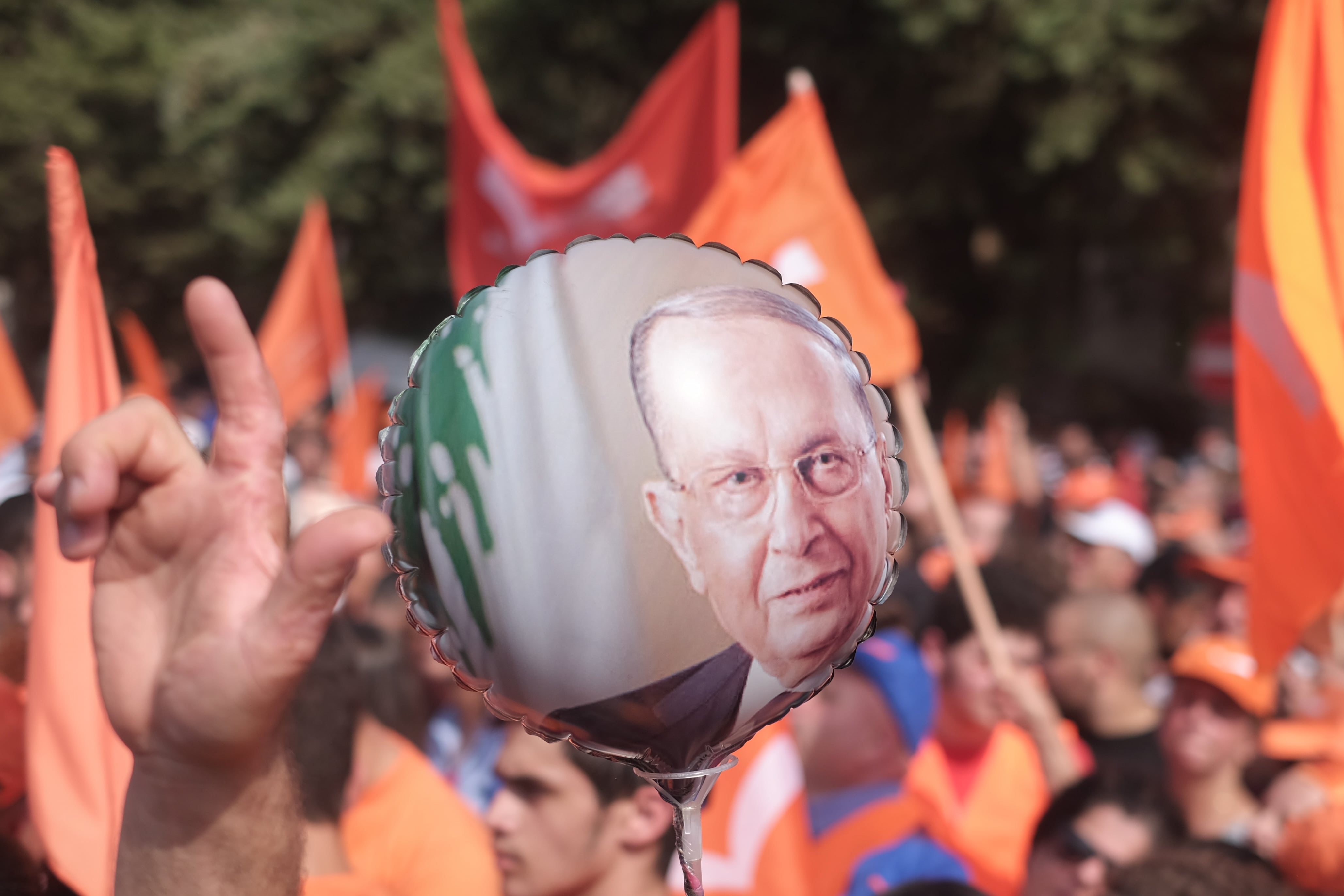 A balloon showing former President Michel Aoun's face, at a ceremony marking his departure from office on Oct. 31, 2022. (Credit: João Sousa/L'Orient Today/File photo)
A balloon showing former President Michel Aoun's face, at a ceremony marking his departure from office on Oct. 31, 2022. (Credit: João Sousa/L'Orient Today/File photo)
Presidential vacancy
After a caretaker cabinet meeting on Oct. 26, caretaker Social Affairs Minister Hector Hajjar said ministers affiliated with the Free Patriotic Movement (FPM) and caretaker Prime Minister Najib Mikati discussed the end of their boycott of cabinet sessions. Hajjar said the FPM is arguing for the president’s prerogatives to be represented by the 24-minister cabinet.
The presidential vacancy has also indirectly caused a spate of vacancies at top government posts, which are typically appointed by the president. After the Oct. 26 cabinet meeting, caretaker Information Minister Ziad Makary said the government does not intend to extend the term of Lebanese Army commander-in-chief Gen. Joseph Aoun ahead of his planned retirement in January, emphasizing that no decision has yet been reached on that issue. Earlier this year, former BDL chief Riad Salameh concluded his tenure without designating a successor, instead delegating command of the central bank to its deputy governors.
FPM head Gebran Bassil met with former Progressive Socialist Party (PSP) leader Walid Joumblatt, Parliament Speaker Nabih Berri and Marada Movement head Sleiman Frangieh in the past week. Frangieh said he and Bassil agreed that “Lebanon is more important than the presidency,” after the FPM leader contested Frangieh’s candidacy despite its longstanding ally Hezbollah’s backing.
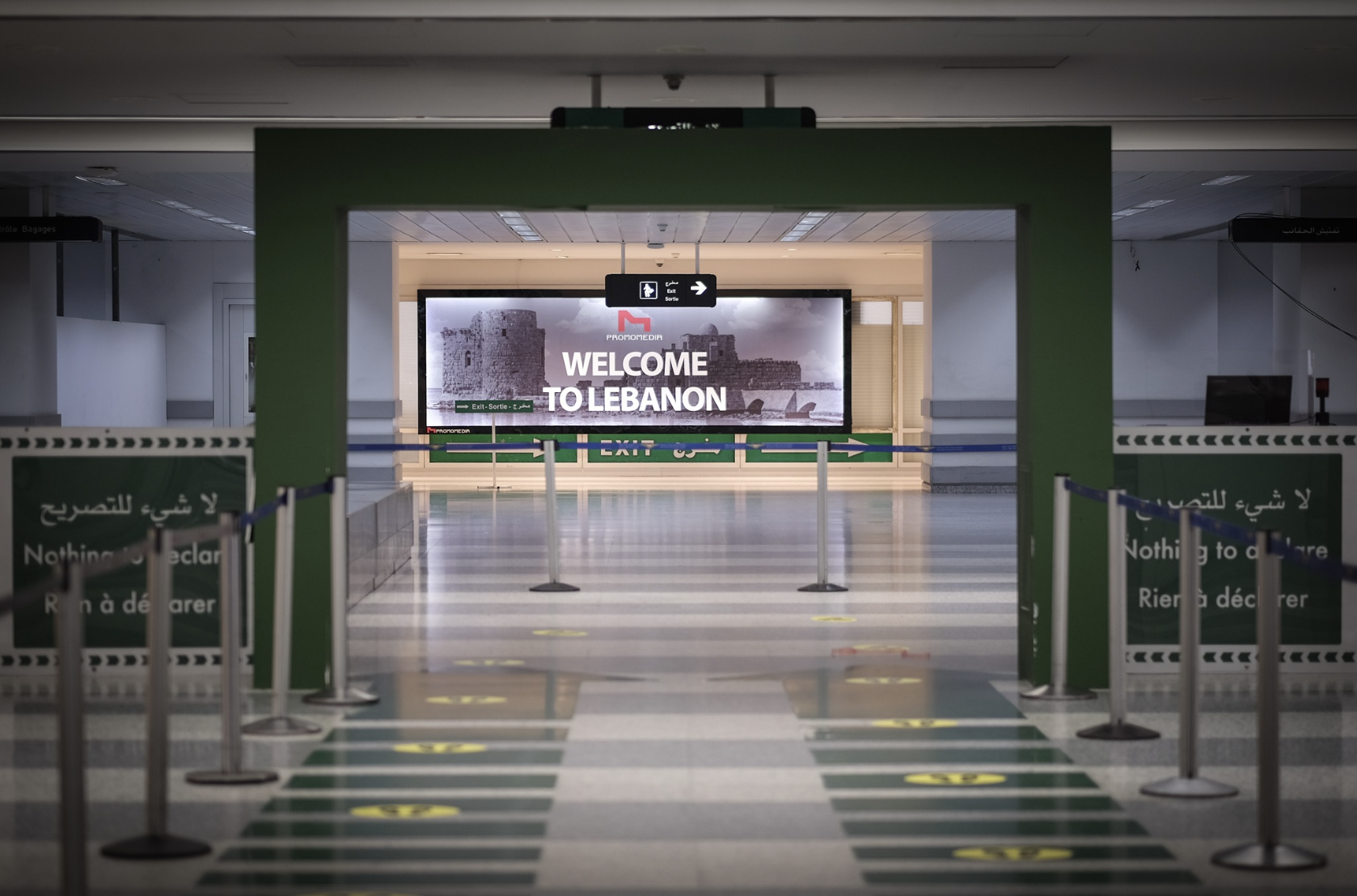 A welcome sign at Beirut's international airport. (Credit: João Sousa/L'Orient Today/File photo)
A welcome sign at Beirut's international airport. (Credit: João Sousa/L'Orient Today/File photo)
Beirut airport
Cabinet approved several measures on Oct. 19 to compensate for safety deficiencies at Beirut’s international airport. These measures were made in answer to the conclusions of an audit report by the European Aviation Safety Agency (EASA) and the International Civil Aviation Organization (ICAO), leaked to the press in August. It revealed shortcomings in the airport's communications, navigation and other services.
Among other things, the government signed a decree to authorize the hiring of 25 new air traffic controllers to fill in the vacant positions. It authorized the Public Works Ministry to sign a contract with a training institute to teach the new hires how to do the job. It also authorized the ministry to make a deal with the Lebanese Army to allocate 15 qualified officers to support the air controllers.
Samir Kassir Foundation President Gisèle Khoury dies
The Samir Kassir Foundation announced the death of its founder and president, journalist Gisèle Khoury on Oct. 15. “She built a foundation that has become an international reference on the defense of freedom,” SKeyes executive director Ayman Mehanna told L’Orient Today.
Gisèle Khoury began her career as a journalist in 1985 at Lebanon’s LBCI TV channel presenting cultural programs. In 2002, she joined the pan-Arab media group MBC and helped launch Al-Arabiya TV. Between 2003 and 2013, she hosted a political talk show on Al-Arabiya. Khoury joined BBC Arabic in 2013, where she hosted The Scene.
She was the widow of Samir Kassir, a Lebanese journalist and intellectual known for both his advocacy of Palestinian rights and his struggle against Syria’s Assad regime. He was assassinated by a car bomb in June 2005.
In other news:
Robberies: The Finance Ministry’s Institut des Finances Basil Fuleihan was robbed, making it the latest public institution targeted after thieves struck the National News Agency archives in February amid repeated pilfering of public infrastructure (including copper electricity transmission cables and batteries powering telecoms stations).
Security: Security and Civil Defense forces have continued to conduct routine activities. Security personnel announced several arrests, with targets including an international scamming group, an alleged heroin dealer, a hold-up gang, an accused currency counterfeiter, a washing-machine thief, individuals accused of killing and robbing a man in Bourj Hammoud and a woman who allegedly killed a man to avenge her brother. The Regie Libanaise de Tabacs et Tombacs (RLTT) announced raids on a warehouse storing cigar manufacturing materials in Zouk Mosbeh and a vape store in Zouk Mikael.
Firefighting: A fire at a Tripoli market on Oct. 16 damaged several stalls, causing gas cylinders stored within to explode. Former Tripoli MP Misbah al-Ahdab said the fire destroyed the livelihoods of dozens of families, while Civil Defense’s ability to respond was impeded by fuel shortages.
Aid donations: Japan announced a grant contract in support of demining operations in the Bekaa. Another Japanese donation was announced to the Organization for Social and Agricultural Development to construct a water pipeline in Ainata providing approximately 2,700 with clean and affordable water.
No need to stock up: Beirut and Mount Lebanon Bakery Owners’ Union head Nasser Srour on Oct. 9 urged citizens to not stockpile bread, reaffirming that sufficient stocks were available in case of a war. The Lebanese Pharmaceuticals Importers and Wholesalers Association issued similar assurances on Oct. 25, saying it is still able to receive medicine shipments, while its current stock — which it compiled and communicated to the Health Ministry — includes three to four months’ worth of drugs sold in pharmacies (e.g. anti-inflammatories, chronic illness drugs); four to five months’ worth of hospital-administered pharmaceuticals; and up to a month and a half’s worth of cancer drugs.
The Lebanese Shipping Agents Syndicate announced that a record number of containers had been processed at Beirut port on Oct. 13 with the passage of more than 2,400 freight containers. In the week prior to “Al-Aqsa Flood,” container processing at the Beirut port stopped for three days due to a computer system failure.
Environment: The Kfar Hazir Environmental Committee threatened to file an international complaint against the Lebanese government if it reduces restrictions regulating the work of quarries and crushers in Decree 8803, as caretaker Industry Minister George Bouchikian proposed.
Weather: Heavy rain continued to interrupt traffic across Lebanon. Civil Defense has repeatedly intervened to rescue motorists from flooded roads. Floods are a yearly occurrence in Lebanon. The government blames sanitation companies for not clearing the trash clogging drains, to which the companies retort that this problem is rooted in decades-long negligence.
Justice: The Industry Ministry on Oct. 24 authorized legal action against ministry General-Director Dany Gedeon, who has been suspended since May over allegations of neglect of duty and wasting public funds for his reported refusal to cede the headquarters of the Arab Union for Industrial Exports Development to the union’s chief.
Healthcare: The National Social Security Fund (NSSF) said on Oct. 24 it transferred LL50 billion to hospitals to cover dialysis treatments, less than two weeks after making an LL46 billion payment, which beneficiaries receive free of charge. The NSSF warned hospitals against charging dialysis patients further fees.
Inflation: Year-on-year, Lebanon had the highest global real inflation rate in food prices, according to the World Bank’s Food Security Update, published on Oct. 12. Lebanon’s nominal inflation rate was second globally, behind Venezuela. Real food price inflation is calculated as the difference between food inflation and overall inflation.